- Home
- George Orwell
Down and Out in Paris and London Page 3
Down and Out in Paris and London Read online
Page 3
He is talking of love, his favourite subject.
'Ah, l'amour, l'amour! Ah, que les femmes m'ont tue! Alas, messieurs et dames, women have been my ruin, beyond all hope my ruin. At twenty-two I am utterly worn out and finished. But what things I have learned, what abysses of wisdom have I not plumbed! How great a thing it is to have acquired the true wisdom, to have become in the highest sense of the word a civilised man, to have become raffine, vicieux,' etc. etc.
'Messieurs et dames, I perceive that you are sad. Ah, mais la vie est belle-you must not be sad. Be more gay, I beseech you!
Fill high ze bowl vid Samian vine,
Ve vill not sink of semes like zese!
'Ah, que la vie est belle! Listen, messieurs et dames, out of the fullness of my experience I will discourse to you of love. I will explain to you what is the true meaning of love-what is the true sensibility, the higher, more refined pleasure which is known to civilised men alone. I will tell you of the happiest day of my life. Alas, but I am past the time when I could know such happiness as that. It is gone for ever-the very possibility, even the desire for it, are gone.
'Listen, then. It was two years ago; my brother was in Paris-he is a lawyer-and my parents had told him to find me and take me out to dinner. We hate each other, my brother and I, but he preferred not to disobey my parents. We dined, and at dinner he grew very drunk upon three bottles of Bordeaux. I took him back to his hotel, and on the way I bought a bottle of brandy, and when we had arrived I made my brother drink a tumblerful of it-I told him it was something to make him sober. He drank it, and immediately he fell down like somebody in a fit, dead drunk. I lifted him up and propped his back against the bed; then I went through his pockets. I found eleven hundred francs, and with that I hurried down the stairs, jumped into a taxi, and escaped. My brother did not know my address-I was safe.
'Where does a man go when he has money? To the bordels, naturally. But you do not suppose that I was going to waste my time on some vulgar debauchery fit only for navvies? Confound it, one is a civilised man! I was fastidious, exigeant, you understand, with a thousand francs in my pocket. It was midnight before I found what I was looking for. I had fallen in with a very smart youth of eighteen, dressed en smoking and with his hair cut a l'americaine, and we were talking in a quiet bistro away from the boulevards. We understood one another well, that youth and I. We talked of this and that, and discussed ways of diverting oneself. Presently we took a taxi together and were driven away.
'The taxi stopped in a narrow, solitary street with a single gas-lamp flaring at the end. There were dark puddles among the stones. Down one side ran the high blank wall of a convent. My guide led me to a tall, ruinous house with shuttered windows, and knocked several times at the door. Presently there was a sound of footsteps and a shooting of bolts, and the door opened a little. A hand came round the edge of it; it was a large, crooked hand, that held itself palm upwards under our noses, demanding money.
'My guide put his foot between the door and the step. "How much do you want?" he said.
'"A thousand francs," said a woman's voice. "Pay up at once or you don't come in."
'I put a thousand francs into the hand and gave the remaining hundred to my guide; he said good night and left me. I could hear the voice inside counting the notes, and then a thin old crow of a woman in a black dress put her nose out and regarded me suspiciously before letting me in. It was very dark inside; I could see nothing except a flaring gas-jet that illuminated a patch of plaster wall, throwing everything else into deeper shadow. There was a smell of rats and dust. Without speaking, the old woman lighted a candle at the gas-jet, then hobbled in front of me down a stone passage to the top of a flight of stone steps.
'"Voila!" she said; "go down into the cellar there and do what you like. I shall see nothing, hear nothing, know nothing. You are free, you understand-perfectly free."
'Ah, messieurs, need I describe to you-forcement, you know it yourselves-that shiver, half of terror and half of joy, that goes through one at these moments? I crept down, feeling my way; I could hear my breathing and the scraping of my feet on the stones, otherwise all was silence. At the bottom of the stairs my hand met an electric switch. I turned it, and a great electrolier of twelve red globes flooded the cellar with a red light. And behold, I was not in a cellar, but in a bedroom, a great rich garish bedroom, coloured blood red from top to bottom. Figure it to yourselves, messieurs et dames! Red carpet on the floor, red paper on the walls, red plush on the chairs, even the ceiling red; everywhere red, burning into the eyes. It was a heavy, stifling red, as though the light were shining through bowls of blood. At the far end stood a huge square bed, with quilts red like the rest, and on it a girl was lying, dressed in a frock of red velvet. At the sight of me she shrank away and tried to hide her knees under the short dress.
'I had halted by the door. "Come here, my chicken," I called to her.
'She gave a whimper of fright. With a bound I was beside the bed; she tried to elude me, but I seized her by the throat-like this, do you see?-tight! She struggled, she began to cry out for mercy, but I held her fast, forcing back her head and staring down into her face. She was twenty years old, perhaps; her face was the broad dull face of a stupid child, but it was coated with paint and powder, and her blue, stupid eyes, shining in the red light, wore that shocked, distorted look that one sees nowhere save in the eyes of these women. She was some peasant girl, doubtless, whom her parents had sold into slavery.
'Without another word I pulled her off the bed and threw her onto the floor. And then I fell upon her like a tiger! Ah, the joy, the incomparable rapture of that time! There, messieurs et dames, here is what I would expound to you; voila l'amour! There is the true love, there is the only thing in the world worth striving for; there is the thing beside which all your arts and ideals, all your philosophies and creeds, all your fine words and high attitudes, are as pale and profitless as ashes. When one has experienced love-the true love-what is there in the world that seems more than a mere ghost of joy?
'More and more savagely I renewed the attack. Again and again the girl tried to escape; she cried out for mercy anew, but I laughed at her.
'"Mercy!" I said, "do you suppose I have come here to show mercy? Do you suppose I have paid a thousand francs for that?" I swear to you, messieurs et dames, that if it were not for that accursed law that robs us of our liberty, I would have murdered her at that moment.
'Ah, how she screamed, with what bitter cries of agony. But there was no one to hear them; down there under the streets of Paris we were as secure as at the heart of a pyramid. Tears streamed down the girl's face, washing away the powder in long dirty smears. Ah, that irrecoverable time! You, messieurs et dames, you who have not cultivated the finer sensibilities of love, for you such pleasure is almost beyond conception. And I too, now that my youth is gone-ah, youth!-shall never again see life so beautiful as that. It is finished.
'Ah yes, it is gone-gone for ever. Ah, the poverty, the shortness, the disappointment of human joy! For in reality-car en realite, what is the duration of the supreme moment of love? It is nothing, an instant, a second perhaps. A second of ecstasy, and after that-dust, ashes, nothingness.
'And so, just for one instant, I captured the supreme happiness, the highest and most refined emotion to which human beings can attain. And in the same moment it was finished, and I was left-to what? All my savagery, my passion, were scattered like the petals of a rose. I was left cold and languid, full of vain regrets; in my revulsion I even felt a kind of pity for the weeping girl on the floor. Is it not nauseous, that we should be the prey of such mean emotions? I did not look at the girl again; my sole thought was to get away. I hastened up the steps of the vault and out into the street. It was dark and bitterly cold, the streets were empty, the stones echoed under my heels with a hollow, lonely ring. All my money was gone, I had not even the price of a taxi fare. I walked back alone to my cold, solitary room.
'But there, messieurs et dame
s, that is what I promised to expound to you. That is Love. That was the happiest day of my life.'
He was a curious specimen, Charlie. I describe him, just to show what diverse characters could be found flourishing in the Coq d'Or quarter.
III
I LIVED in the Coq d'Or quarter for about a year and a half. One day, in summer, I found that I had just four hundred and fifty francs left, and beyond this nothing but thirty-six francs a week, which I earned by giving English lessons. Hitherto I had not thought about the future, but I now realised that I must do something at once. I decided to start looking for a job, and-very luckily as it turned out-I took the precaution of paying two hundred francs for a month's rent in advance. With the other two hundred and fifty francs, besides the English lessons, I could live a month, and in a month I should probably find work. I aimed at becoming a guide to one of the tourist companies, or perhaps an interpreter. However, a piece of bad luck prevented this.
One day there turned up at the hotel a young Italian who called himself a compositor. He was rather an ambiguous person, for he wore side whiskers, which are the mark either of an apache or an intellectual, and nobody was quite certain in which class to put him. Madame F. did not like the look of him, and made him pay a week's rent in advance. The Italian paid the rent and stayed six nights at the hotel. During this time he managed to prepare some duplicate keys, and on the last night he robbed a dozen rooms, including mine. Luckily he did not find the money that was in my pockets, so I was not left penniless. I was left with just forty-seven francs-that is, seven and ten-pence.
This put an end to my plans of looking for work. I had now got to live at the rate of about six francs a day, and from the start it was too difficult to leave much thought for anything else. It was now that my experiences of poverty began-for six francs a day, if not actual poverty, is on the fringe of it. Six francs is a shilling, and you can live on a shilling a day in Paris if you know how. But it is a complicated business.
It is altogether curious, your first contact with poverty. You have thought so much about poverty-it is the thing you have feared all your life, the thing you knew would happen to you sooner or later; and it is all so utterly and prosaically different. You thought it would be quite simple; it is extraordinarily complicated. You thought it would be terrible; it is merely squalid and boring. It is the peculiar lowness of poverty that you discover first; the shifts that it puts you to, the complicated meanness, the crust-wiping.
You discover, for instance, the secrecy attaching to poverty. At a sudden stroke you have been reduced to an income of six francs a day. But of course you dare not admit it-you have got to pretend that you are living quite as usual. From the start it tangles you in a net of lies, and even with the lies you can hardly manage it. You stop sending clothes to the laundry, and the laundress catches you in the street and asks you why; you mumble something, and she, thinking you are sending the clothes elsewhere, is your enemy for life. The tobacconist keeps asking why you have cut down your smoking. There are letters you want to answer, and cannot, because stamps are too expensive. And then there are your meals-meals are the worst difficulty of all. Every day at meal-times you go out, ostensibly to a restaurant, and loaf an hour in the Luxembourg Gardens, watching the pigeons. Afterwards you smuggle your food home in your pockets. Your food is bread and margarine, or bread and wine, and even the nature of the food is governed by lies. You have to buy rye bread instead of household bread, because the rye loaves, though dearer, are round and can be smuggled in your pockets. This wastes you a franc a day. Sometimes, to keep up appearances, you have to spend sixty centimes on a drink, and go correspondingly short of food. Your linen gets filthy, and you run out of soap and razor-blades. Your hair wants cutting, and you try to cut it yourself, with such fearful results that you have to go to the barber after all, and spend the equivalent of a day's food. All day you are telling lies, and expensive lies.
You discover the extreme precariousness of your six francs a day. Mean disasters happen and rob you of food. You have spent your last eighty centimes on half a litre of milk, and are boiling it over the spirit lamp. While it boils a bug runs down your forearm; you give the bug a flick with your nail, and it falls plop! straight into the milk. There is nothing for it but to throw the milk away and go foodless.
You go to the baker's to buy a pound of bread, and you wait while the girl cuts a pound for another customer. She is clumsy, and cuts more than a pound. 'Pardon, monsieur,' she says, 'I suppose you don't mind paying two sous extra?' Bread is a franc a pound, and you have exactly a franc. When you think that you too might be asked to pay two sous extra, and would have to confess that you could not, you bolt in panic. It is hours before you dare venture into a baker's shop again.
You go to the greengrocer's to spend a franc on a kilogram of potatoes. But one of the pieces that make up the franc is a Belgian piece, and the shopman refuses it. You slink out of the shop, and can never go there again.
You have strayed into a respectable quarter, and you see a prosperous friend coming. To avoid him you dodge into the nearest cafe. Once in the cafe you must buy something, so you spend your last fifty centimes on a glass of black coffee with a dead fly in it. One could multiply these disasters by the hundred. They are part of the process of being hard up.
You discover what it is like to be hungry. With bread and margarine in your belly, you go out and look into the shop windows. Everywhere there is food insulting you in huge, wasteful piles; whole dead pigs, baskets of hot loaves, great yellow blocks of butter, strings of sausages, mountains of potatoes, vast Gruyere cheeses like grindstones. A snivelling self-pity comes over you at the sight of so much food. You plan to grab a loaf and run, swallowing it before they catch you; and you refrain, from pure funk.
You discover the boredom which is inseparable from poverty; the times when you have nothing to do and, being underfed, can interest yourself in nothing. For half a day at a time you lie on your bed, feeling like the jeune squelette in Baudelaire's poem. Only food could rouse you. You discover that a man who has gone even a week on bread and margarine is not a man any longer, only a belly with a few accessory organs.
This-one could describe it further, but it is all in the same style-is life on six francs a day. Thousands of people in Paris live it-struggling artists and students, prostitutes when their luck is out, out-of-work people of all kinds. It is the suburbs, as it were, of poverty.
I continued in this style for about three weeks. The forty-seven francs were soon gone, and I had to do what I could on thirty-six francs a week from the English lessons. Being inexperienced, I handled the money badly, and sometimes I was a day without food. When this happened I used to sell a few of my clothes, smuggling them out of the hotel in small packets and taking them to a second-hand shop in the Rue de la Montagne St Genevieve. The shopman was a red-haired Jew, an extraordinarily disagreeable man, who used to fall into furious rages at the sight of a client. From his manner one would have supposed that we had done him some injury by coming to him. 'Merde!' he used to shout, 'you here again? What do you think this is? A soup kitchen?' And he paid incredibly low prices. For a hat which I had bought for twenty-five shillings and scarcely worn he gave five francs, for a good pair of shoes five francs, for shirts a franc each. He always preferred to exchange rather than buy, and he had a trick of thrusting some useless article into one's hand and then pretending that one had accepted it. Once I saw him take a good overcoat from an old woman, put two white billiard-balls into her hand, and then push her rapidly out of the shop before she could protest. It would have been a pleasure to flatten the Jew's nose, if only one could have afforded it.
These three weeks were squalid and uncomfortable, and evidently there was worse coming, for my rent would be due before long. Nevertheless, things were not a quarter as bad as I had expected. For, when you are approaching poverty, you make one discovery which outweighs some of the others. You discover boredom and mean complications and the beginnings of hung
er, but you also discover the great redeeming feature of poverty: the fact that it annihilates the future. Within certain limits, it is actually true that the less money you have, the less you worry. When you have a hundred francs in the world you are liable to the most craven panics. When you have only three francs you are quite indifferent; for three francs will feed you till tomorrow, and you cannot think further than that. You are bored, but you are not afraid. You think vaguely, 'I shall be starving in a day or two-shocking, isn't it?' And then the mind wanders to other topics. A bread and margarine diet does, to some extent, provide its own anodyne.
And there is another feeling that is a great consolation in poverty. I believe everyone who has been hard up has experienced it. It is a feeling of relief, almost of pleasure, at knowing yourself at last genuinely down and out. You have talked so often of going to the dogs-and well, here are the dogs, and you have reached them, and you can stand it. It takes off a lot of anxiety.
IV
ONE DAY my English lessons ceased abruptly. The weather was getting hot and one of my pupils, feeling too lazy to go on with his lessons, dismissed me. The other disappeared from his lodgings without notice, owing me twelve francs. I was left with only thirty centimes and no tobacco. For a day and a half I had nothing to eat or smoke, and then, too hungry to put it off any longer, I packed my remaining clothes into my suitcase and took them to the pawnshop. This put an end to all pretence of being in funds, for I could not take my clothes out of the hotel without asking Madame F.'s leave. I remember, however, how surprised she was at my asking her instead of removing the clothes on the sly, shooting the moon being a common trick in our quarter.

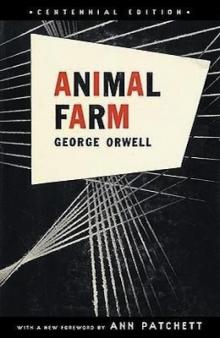 Animal Farm & 1984
Animal Farm & 1984 Homage to Catalonia
Homage to Catalonia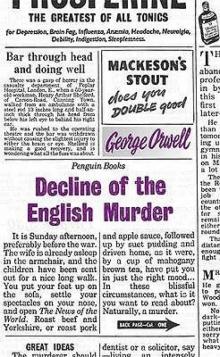 Decline of the English Murder
Decline of the English Murder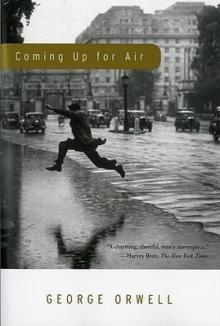 Coming Up for Air
Coming Up for Air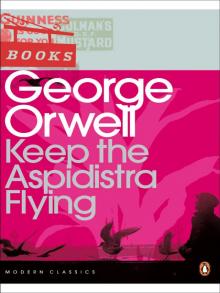 Keep the Aspidistra Flying
Keep the Aspidistra Flying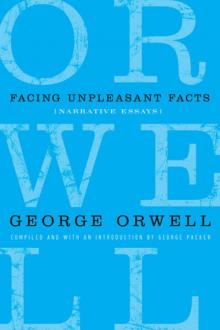 Facing Unpleasant Facts: Narrative Essays
Facing Unpleasant Facts: Narrative Essays The Complete Novels of George Orwell
The Complete Novels of George Orwell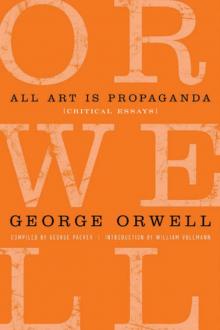 All Art Is Propaganda: Critical Essays
All Art Is Propaganda: Critical Essays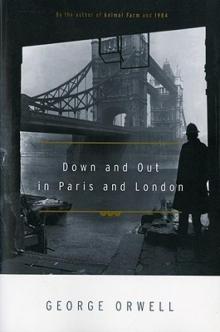 Down and Out in Paris and London
Down and Out in Paris and London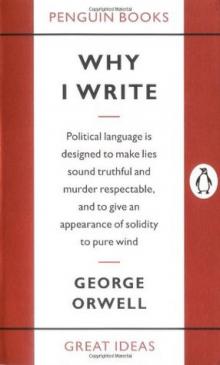 Why I Write
Why I Write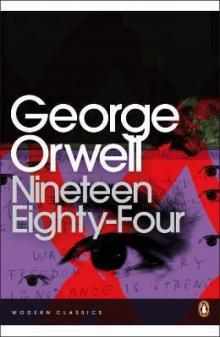 Nineteen Eighty-Four
Nineteen Eighty-Four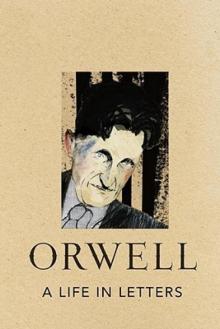 A Life in Letters
A Life in Letters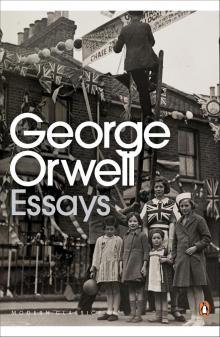 Essays
Essays A Clergyman's Daughter
A Clergyman's Daughter Fifty Orwell Essays
Fifty Orwell Essays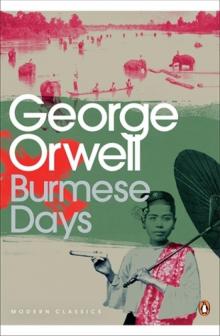 Burmese Days
Burmese Days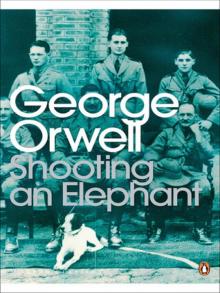 Shooting an Elephant
Shooting an Elephant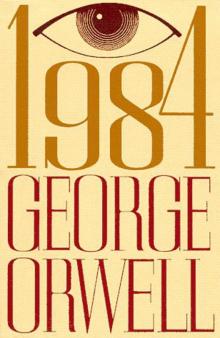 1984 (Penguin)
1984 (Penguin)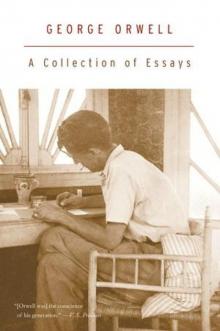 A Collection of Essays
A Collection of Essays 1984
1984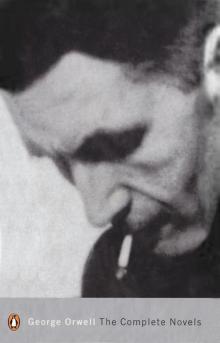 The Complete Novels
The Complete Novels All Art Is Propaganda
All Art Is Propaganda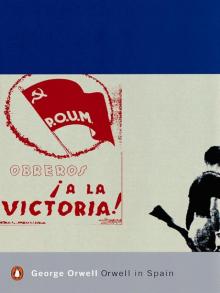 Orwell in Spain
Orwell in Spain Animal Farm: A Fairy Story
Animal Farm: A Fairy Story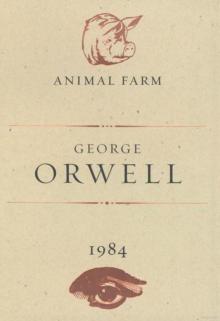 Animal Farm and 1984
Animal Farm and 1984